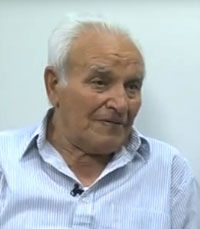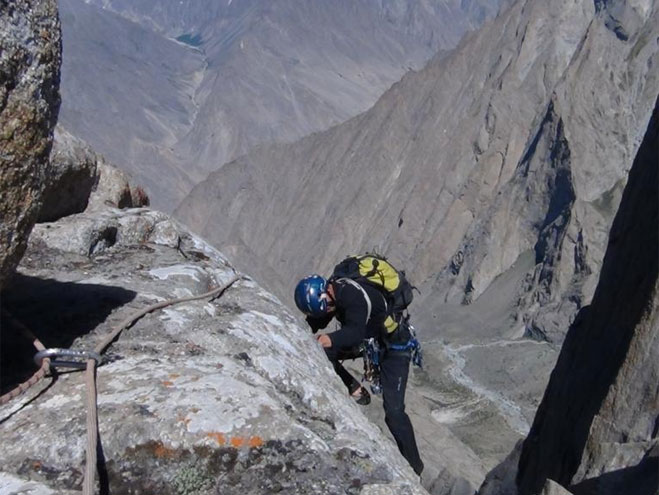 Alpine climbing was born some 230 years ago. The first alpine club was founded in London in 1857. The first Bulgarian mountaineering club was created years later. Although much younger, Bulgarian mountaineering has its place in history, Associate Professor Sandyu Beshev, who has been studying the history and development of alpinism for 50 years, says. He is one of Bulgarian mountaineers, who made it possible for Bulgarians to conquer Everest, K2 and many other eight-thousanders. Among the doyens who had contribution to this are Konstantin Savadzhiev, who in 1938 climbed Malyovitsa (2731) from the previously considered inaccessible northern wall, Georgi Atanasov - Djidji - the only mountaineering professor in this country, Avram Avramov - head of the Everest 84 expedition:
Alpine climbing was born some 230 years ago. The first alpine club was founded in London in 1857. The first Bulgarian mountaineering club was created years later. Although much younger, Bulgarian mountaineering has its place in history, Associate Professor Sandyu Beshev, who has been studying the history and development of alpinism for 50 years, says. He is one of Bulgarian mountaineers, who made it possible for Bulgarians to conquer Everest, K2 and many other eight-thousanders. Among the doyens who had contribution to this are Konstantin Savadzhiev, who in 1938 climbed Malyovitsa (2731) from the previously considered inaccessible northern wall, Georgi Atanasov - Djidji - the only mountaineering professor in this country, Avram Avramov - head of the Everest 84 expedition:
 "In 1895 Bulgarian student Parashkev Stoyanov, son of Ivancho Stoyanov - the man bought the tickets for Radetzky ship for the revolutionary group of Hristo Botev, climbed Grand Combin (4318) in the Alps. This attracted the attention of Aleko Konstantinov himself, who personally congratulated him. This climb is considered the birthday of Bulgarian alpinism. In 1929, he published the first practical and comprehensive tourism guide, in which he devoted a special place to alpinism - theory, practice, equipment. Late Alexander Belkovski is a renowned doyen of Bulgarian mountaineering, too. He graduated in Grenoble and was also a mountain guide which helped him climb over 30 peaks. Another student, Lyuben Telcharov, also climbed many peaks in the Alps. His friends and fellow students practiced mountaineering in Bulgaria, but they had no organization initially. It emerged thanks to Stefan Popov, who was not an avid alpinist but had great organisational skills. For many years, his contribution to the development of Bulgarian mountaineering remained unacknowledged. On 19 November 1929 the Bulgarian Mountaineering Club was established. In 1934 the club was renamed into Bulgarian Alpine Club. A few months later the International Union of Alpine Clubs invited the Bulgarian Alpine Club to become its member and Bulgaria joined on November 2, 1935."
"In 1895 Bulgarian student Parashkev Stoyanov, son of Ivancho Stoyanov - the man bought the tickets for Radetzky ship for the revolutionary group of Hristo Botev, climbed Grand Combin (4318) in the Alps. This attracted the attention of Aleko Konstantinov himself, who personally congratulated him. This climb is considered the birthday of Bulgarian alpinism. In 1929, he published the first practical and comprehensive tourism guide, in which he devoted a special place to alpinism - theory, practice, equipment. Late Alexander Belkovski is a renowned doyen of Bulgarian mountaineering, too. He graduated in Grenoble and was also a mountain guide which helped him climb over 30 peaks. Another student, Lyuben Telcharov, also climbed many peaks in the Alps. His friends and fellow students practiced mountaineering in Bulgaria, but they had no organization initially. It emerged thanks to Stefan Popov, who was not an avid alpinist but had great organisational skills. For many years, his contribution to the development of Bulgarian mountaineering remained unacknowledged. On 19 November 1929 the Bulgarian Mountaineering Club was established. In 1934 the club was renamed into Bulgarian Alpine Club. A few months later the International Union of Alpine Clubs invited the Bulgarian Alpine Club to become its member and Bulgaria joined on November 2, 1935."
The Bulgarian Climbing and Mountaineering Federation is a member of several international federations – the Climbing and Mountaineering Federation since 1935, the Sport Climbing Federation since 2007 and the Ski Mountaineering Federation since 2008. Why are these memberships important?
"If we were not members of the International Union of Alpine Clubs we would have had great difficulties in organising expeditions to the Himalayas. The Ministry of Tourism in Nepal requires a document proving that we are members of the International Union of Alpine Clubs. The membership allows organising independent Bulgarian expeditions."
On the world map there are 44 peaks, conquered for the first time by Bulgarian mountaineers and bearing Bulgarian names.
 "Mountaineers from the People's Army have great contribution for this. In 1968, together with the Soviet army climbers, Bulgarian climbed for the first time peaks in Pamir that were given Bulgarian names - Shipka (5666) and Bulgaria (6504). The legalization procedure requires those who have conquered the peak to describe the route and take photos of the peak. Documents are submitted to a committee in the National Assembly and to respective institutions abroad. The engine of this venture was Encho Petkov, a legend of Bulgarian alpinism. In Pamir-Alay he made first ascents of several peaks that were named Plovdiv, Sofia, Georgi Dimitrov (5111), Komsomolska Iskra, Dimitrovsky Komsomol. In Mongolia and Peru, there are also peaks bearing Bulgarian names. In 2012 the doyen of mountaineering Nikolai Petkov together with Doychin Boyanov and Mihail Mihaylov conquered several peaks in Karakorum, which they named Vasil Levski (5733), Tangra, Rila, Sofia. These include the peaks that Doychin Boyanov and Nikolay Petkov named in Antarctica. Indeed, there are 44 peaks, which were first climbed by Bulgarians and received Bulgarian names."
"Mountaineers from the People's Army have great contribution for this. In 1968, together with the Soviet army climbers, Bulgarian climbed for the first time peaks in Pamir that were given Bulgarian names - Shipka (5666) and Bulgaria (6504). The legalization procedure requires those who have conquered the peak to describe the route and take photos of the peak. Documents are submitted to a committee in the National Assembly and to respective institutions abroad. The engine of this venture was Encho Petkov, a legend of Bulgarian alpinism. In Pamir-Alay he made first ascents of several peaks that were named Plovdiv, Sofia, Georgi Dimitrov (5111), Komsomolska Iskra, Dimitrovsky Komsomol. In Mongolia and Peru, there are also peaks bearing Bulgarian names. In 2012 the doyen of mountaineering Nikolai Petkov together with Doychin Boyanov and Mihail Mihaylov conquered several peaks in Karakorum, which they named Vasil Levski (5733), Tangra, Rila, Sofia. These include the peaks that Doychin Boyanov and Nikolay Petkov named in Antarctica. Indeed, there are 44 peaks, which were first climbed by Bulgarians and received Bulgarian names."
English: Alexander Markov
Photos: archiveBringing youthful energy, colour and cheer to the Bulgarian National Radio studio, students from the Bulgarian Sunday School Dr Petar Beron arrived from Larnaca. The group from Cyprus — 16 pupils aged between 14 and 19 — is currently on a week-long..
At the outset of the war between Russia and Ukraine, the Bessarabian Bulgarians across all lands marked their national day with prayers for peace. Nearly four years on, burdened with even greater sorrow, they commemorate that special day scattered..
Switzerland is one of the smaller Central European countries on the Old Continent. It consists of twenty-six cantons with a population of about 9 million people, according to the latest Eurostat data from 2024. 41% of those residing in the country are..
On November 8 in Hall 11 of the National Palace of Culture, Bulgaria’s best masters and artisans will be awarded for the third time. The founder and..

+359 2 9336 661
